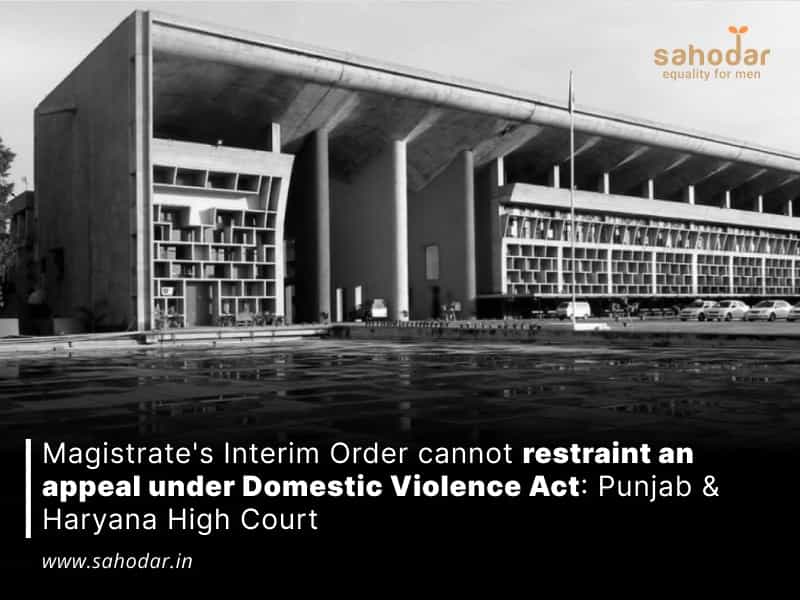According to a ruling by the Punjab & Haryana High Court, an appeal can be made under Section 29 of the Protection of Women from Domestic Violence Act, 2005 (the DV Act) against an interim order issued by a Magistrate under Section 23 (Power to grant interim and ex parte orders) of the DV Act, and the appellate court has the authority to issue interim orders under Section 29 of the DV Act.
Justice Jagmohan Bansal, a single judge bench, stated that the appellate court’s authority to issue interim orders under Section 29 of the Protection of Women from Domestic Violence Act should not be restricted. While the appellate court may choose not to exercise this power, denying it would curtail the powers of the appellate court, which is contrary to established legal principles. It is unacceptable that the Magistrate can issue interim orders but the appellate court cannot.
Facts of the case
The wife, who is the petitioner, filed a petition under Section 12 (Application to Magistrate) of the Protection of Women from Domestic Violence Act seeking maintenance and other reliefs. Additionally, the petitioner submitted an application under Section 23 of the DV Act requesting interim maintenance. The Magistrate ordered the husband, who is the respondent, to pay Rs. 60,000/- as interim maintenance to the petitioner and their minor child on September 22, 2022.
The husband filed an appeal under Section 29 of the DV Act before the Sessions Court seeking to have the Magistrate’s interim order overturned. The Sessions Court partially stayed the interim maintenance order granted by the Magistrate through an order dated October 18, 2022, directing the husband to pay Rs. 15,000/- per month as interim maintenance until the case is finally disposed of.
The petitioner disputed the Sessions Court’s order, arguing that an appeal under Section 29 of the DV Act can only be filed against a final order and not against an interim order issued under Section 23 of the DV Act. The petitioner also claimed that in the absence of explicit authority under Section 29 of the DV Act, the Appellate Court lacks the power to suspend the Magistrate’s interim order.
On the other hand, the respondent-husband’s legal representative contended that the term “order” used in Section 29 of the DV Act includes interim orders, and the power to hear appeals under Section 29 also includes the ability to issue interim orders by the Appellate Court.
Observation of the court
The court considered two questions: first, whether an appeal under Section 29 of the DV Act can be filed against an interim order issued by a Magistrate under Section 23 of the DV Act, and second, whether the Appellate Court can issue interim orders while hearing an appeal under Section 29 of the DV Act.
Regarding the first question, the court noted that the DV Act is a unique law, and after analyzing Sections 28 and 29, it is apparent that the provisions of the CrPC are not applicable to appeals against orders issued by the Magistrate under the DV Act. The court also observed that the legislature has expressly indicated where it did not want to permit appeals against interim orders.
The Court ruled that an appeal against an interim order passed under Section 23 of the DV Act is maintainable under Section 29 of the DV Act because there is no express prohibition on appealing against interim orders.
Regarding the second question, the Court stated that courts and tribunals have inherent and supplementary powers to resolve disputes, which are essential to effectively adjudicate the case.
The Court noted that if the appellate court is not permitted to issue interim orders under Section 29 of the DV Act against an interim order because there is no specific provision for it, then the appellate court would be deprived of its power to issue interim orders even in the case of a final order because there is no such specific provision for it. The court emphasized that the power to exist and the power to utilize are distinct concepts in legal jurisprudence.
Therefore, the Court held that the Appellate Court has the authority to issue interim orders while exercising its power under Section 29 of the DV Act. However, the Court instructed the Sessions Court to resolve the appeal within two months.
Source: https://www.livelaw.in/news-updates/punjab-haryana-high-court-maintainability-of-appeal-interim-orders-section-23-of-domestic-violence-act-appellate-court-223804

